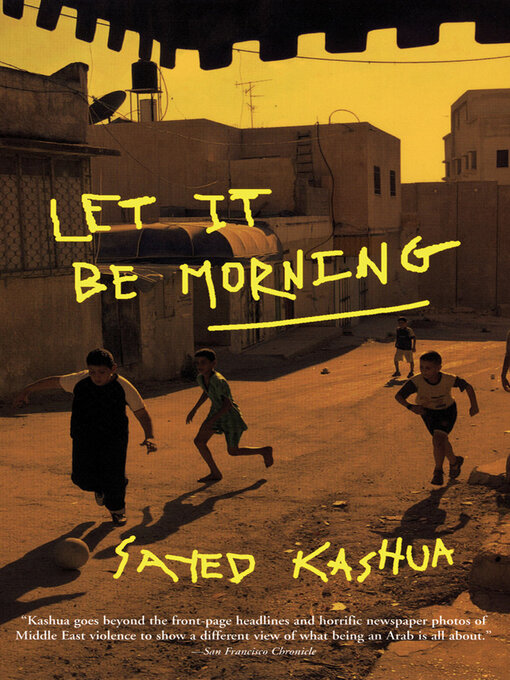A young Arab journalist returns to his hometown—an Arab village in Israel’s borderland near the West Bank. There, his conflicted sense of belonging is forced into crisis when the village becomes a pawn in the endless power struggle that is the Middle East. Hoping to reclaim the simplicity of life among his kin, the prodigal son returns home to find that nothing is as he remembers: everything is smaller, the people are petty and provincial. But when Israeli tanks surround the village without warning or explanation, everyone inside is cut off from the outside world. As the situation grows increasingly dire, paranoia takes hold and the village community devolves into chaos.
In Let It Be Morning, Arab Israeli author Sayed Kashua once again “relates the experience of those caught in the middle, the Arab-Israelis who are citizens but are separated from many of their countrymen by faith and heritage” (School Library Journal).
“Kashua . . . writes about the Israeli Arabs’ balancing act with knowledge and passion.” —Publishers Weekly
-
Creators
-
Publisher
-
Release date
December 1, 2007 -
Formats
-
Kindle Book
-
OverDrive Read
- ISBN: 9781555846626
-
EPUB ebook
- ISBN: 9781555846626
- File size: 2425 KB
-
-
Languages
- English
-
Reviews
-
Publisher's Weekly
April 3, 2006
Kashua's second novel (after Dancing Arabs
) illuminates the lives of Israel's Arab minority. An unnamed Israeli Arab journalist returns from Tel Aviv to his home village with his wife and infant daughter, in search of cheaper living. There, residents flip anxiously between Hebrew news and al-Jazeera to make sense of daily life, and high school students wear both the latest Western clothes and veils in increasing numbers. The journalist's cosmopolitan wife hates their parochial hometown, and when the protagonist finds himself eased out of his position at a prominent Jewish newspaper (surmising that "the privilege of criticizing government policy was an exclusively Jewish prerogative"), he has to hide his unemployment from her. Then one morning, the journalist finds that the Israelis have cordoned the town, cutting off all communication with the outside world. The town is plagued by infighting, mutual suspicion and rekindled feuds, revealing fault lines in the Arab community. Kashua is a journalist for the Israeli daily Ha'aretz
, and he writes about the Israeli Arabs' balancing act with knowledge and passion. -
Library Journal
Starred review from April 15, 2006
The protagonist of Kashua's second novel (after "Dancing Arab"s) is a young Arab-Israeli journalist who moves back to his native village from Tel Aviv to escape increasing marginalization but finds life in the village to be provincial and suffocating. When the Israeli army surrounds the village, closing it off, villagers are unable to go to their jobs or schools, and no goods or services can get in. As the garbage piles up and drinking water becomes scarce, no explanation for the action is forthcoming. This extreme situation is unremarkable to most of the villagers, but the journalist flies into a panic and correctly prepares for the worst. In the end, the reasons behind the military blockade shock even the most complacent villager. Kashua explores what it means to be an outsider -as an Arab in Israel, as an Israeli Arab among Palestinian Arabs, and, as we learn through the journalist's memories of childhood, as an outsider among peers. Kashua also depicts a community's ability to adapt to uncertain circumstances, responding to crises both nobly and shamefully. Shlesinger's smooth translation presents Kashua's skilled and humane story in vibrant, compelling prose. Highly recommended for both public and academic libraries." -Rebecca Stuhr, Grinnell Coll. Libs., IA"Copyright 2006 Library Journal, LLC Used with permission.
-
School Library Journal
September 1, 2006
Adult/High School -A young Arab-Israeli journalist moves from Tel Aviv back to his childhood village with his wife and baby daughter just in time to be caught up in a series of harrowing, dramatic events. In response to Israel -s military presence in the village, neighbors and relatives find themselves fighting one another in order to survive. The first-person narrative gives this novel the sort of immediacy often found in YA fiction; although the narrator is nearly 30, the short chapters and fast pace, combined with the memories of youth that his return home elicits, make for an easy fit for older teens with an interest in other cultures or current events. Some words or concepts are not explicitly defined, but are made clear in context. A real strength here is the unusual perspective; the novel relates the experience of those caught in the middle, the Arab-Israelis who are citizens but are separated from many of their countrymen by faith and heritage. The unspoken answer to the unnamed protagonist -s query about his own village: -Who are they anyhow? - is hinted at in the unsettling conclusion. A natural choice for teens who have discovered Albert Camus - "The Stranger"." -Jenny Gasset, Orange County Public Library, CA"Copyright 2006 School Library Journal, LLC Used with permission.
-
Loading
Why is availability limited?
×Availability can change throughout the month based on the library's budget. You can still place a hold on the title, and your hold will be automatically filled as soon as the title is available again.
The Kindle Book format for this title is not supported on:
×Read-along ebook
×The OverDrive Read format of this ebook has professional narration that plays while you read in your browser. Learn more here.



